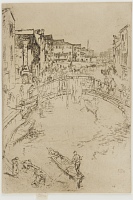The Bridge, Santa Marta | ||
| Number: | 201 | |
| Date: | 1879/1880 | |
| Medium: | etching and drypoint | |
| Size: | 298 x 202 mm | |
| Signed: | butterfly at lower right | |
| Inscribed: | no | |
| Set/Publication: | 'Second Venice Set', 1886 | |
| No. of States: | 9 | |
| Known impressions: | 47 | |
| Catalogues: | K.204; M.201; W.171 | |
| Impressions taken from this plate (47) | ||
KEYWORD
boat, bridge, canal, children, gondola, ghetto, people, sailors, warehouse, washing, wharf.
TITLE
Variations on the title are as follows:
'The Bridge. Santa Marta' (1882, Whistler). 1
'The Bridge S. Marta' (1882, Whistler). 2 'The Bridge' (1883, FAS). 3
'The Bridge' (1886, Frederick Wedmore (1844-1921)). 4
The original title, 'The Bridge, Santa Marta' is preferred.
'The Bridge. Santa Marta' (1882, Whistler). 1
'The Bridge S. Marta' (1882, Whistler). 2 'The Bridge' (1883, FAS). 3
'The Bridge' (1886, Frederick Wedmore (1844-1921)). 4
The original title, 'The Bridge, Santa Marta' is preferred.
1: Whistler to T. McLean, 8 August 1882, GUW #12990.
2: Whistler to Queen Victoria, 12 September 1882, GUW #13072.
3: London FAS 1883 (cat. no. 17).
4: Wedmore 1886 A (cat. no. 171).
DESCRIPTION
A view looking down on a basin leading into a wide canal that first curves to right and then zigzags into the distance. A light iron bridge, busy with pedestrians and hung with washing, spans the canal. On the right are warehouses on a wharf, and at the left, three- and four-storey buildings on a bank that slopes to the water's edge. On the embankment in the foreground a girl stands by a boat in which children are playing. To right, in the basin, a man stands on the stern of a boat, poling, while a boy lies sprawling in the bow. Another boat has just passed under the bridge, the oarsman standing in the stern with his long oar to left. An empty boat lies beside the embankment at left, and there are several boats in the distance, each side of the canal. The canal-side street and wharfs are filled with people. In the distance, there are buildings behind a wider open piazza on the left, and a tall chimney on the skyline, and to right, smaller buildings and bare trees.
SITE
The bridge is the Ponte de l'Arzere or delle Terese, seen from the first-floor window of a house on the Fondamenta Corte Mazor looking north along the Rio de l'Arzere to the Campo di Marte in the district of Santa Marta, Venice, Italy. 5 This view, drawn accurately on the copper plate, is reversed, as usual, in the print. Nearby Whistler drew a pastel, Campo Sta. Marta - Winter Evening [m0753].
5: Grieve 2000, pp. 53-54, repr. p. 53.
DISCUSSION
The Pennell's discussed this etching in relation to earlier work:
'In the Black Lion Wharf, he got the light and shade on his
building by different bitings. In Venice, it was done by
suggesting the shadows. In both series, the small figures
in movement are nearly the same, but there is a great advance
in the drawing in the Venice plates, where they are simply
indicated to give the idea of motion and life. If you compare
the Millbank and the Lagoon, you find in both the subject,
or the dominating lines in the subject, to be the same, a
series of posts carrying the eye from the foreground to the
extreme distance, but their treatment in the Venetian plate
is far more direct and expressive. Simplicity of expression
has never been carried further. Probably the finest plate,
in its simplicity and directness, is The Bridge. Whistler now
obtained the same quality of richness by his manner of
suggesting detail, and also by his printing.' 6
6: Pennell 1908, I, p. 281.
